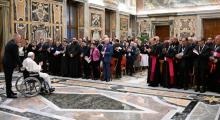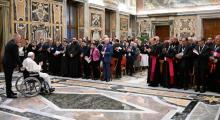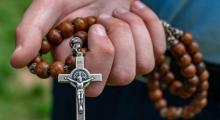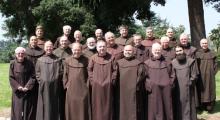Issued by the Catholic Center for Studies and Media - Jordan. Editor-in-chief Fr. Rif'at Bader - موقع أبونا abouna.org
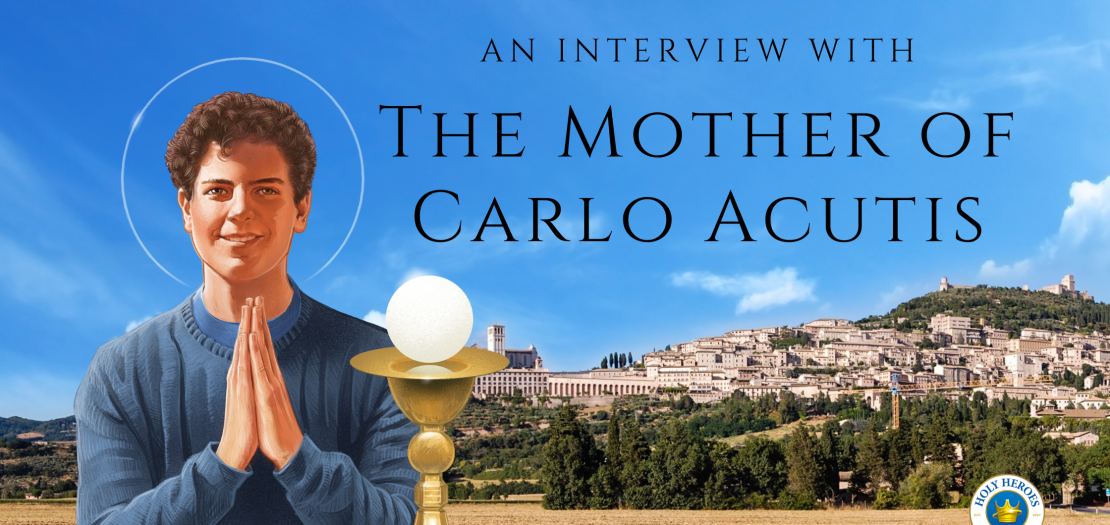
Antonia Acutis, the mother of Blessed Carlo Acutis, is now a first-time book author with My Son Carlo: Carlo Acutis Through the Eyes of His Mother, published by Our Sunday Visitor. This book shares new details about Blessed Carlo’s life: how he spent time with his family, school experiences, vacations and his extraordinary faith that manifested itself from a very young age to everyone around him.
Blessed Carlo’s sanctity is evident reading extended passages of writings from his notebooks. Antonia shares her son's reflections on the Real Presence of Jesus, purgatory, the Blessed Virgin’s role in history, what real conversion is, and the beatitudes, among many other topics. It is a book that cannot be rushed through. Readers will find themselves underlining key passages, writing notes in the margins, coming back to several passages, and wiping away tears as Antonia shares her pain of losing her son to leukemia at the age of 15.
The book is striking in that readers learn about Blessed Carlo’s extremely ordinary life with his dogs, cats, friends, computer programming and videography. This is then juxtaposed to the many supernatural signs from heaven given to Blessed Carlo during his life and after his death: communications with his guardian angel, messages in dreams from the shepherd children of Fatima and inner locutions from Jesus. Antonia also shares many signs she experienced with regards to her son and his God-given mission, such as the first time that she met her spiritual director, Father Ilio Carrai, in 1995, considered by many to be another Padre Pio. On that occasion, Father Carrai told Antonia that he had been expected her for years and that Carlo had been chosen by God for a special task.
Carlo Acutis was beatified on Oct. 10, 2020, in Assisi. He is one of the patrons for the upcoming World Youth Day in Lisbon, which will be August 1-6.
His mother spoke with the Register this month.
Is this your first book? What was your goal in writing it?
I have written a great deal in the past, but this is the first time that I have published a book with my name on it. I started this book for the occasion of Carlo’s beatification. We saw that there were many books being published about Carlo, some of which had been based on the postulator’s books. Several had inaccuracies. One said that Carlo had once given his cape to a homeless person. Nobody in Italy has worn a cape since the Middle Ages! By writing this book, I wanted to clarify several points and give my point of view as his mother. I wanted to give an air of authenticity to his story.
One of the most beautiful parts of your book is when you share with the reader Carlo’s writings from his notebooks. This could have been a book all by itself.
Carlo was very profound. He had an incredible capacity to write. He was much more mature than the average person his age. He was much more advanced than most people.
Carlo was in love with the Eucharist. In what way are you seeing the fruit of his example among young people when it comes to love of the Eucharist? What did Carlo want people to know about the sacraments?
There are many young people who follow the example of Carlo. They get together for Mass and Eucharistic adoration. They are also having a renewed interest in Eucharistic miracles, which have been confirmed by science.
When it comes to the sacraments, many do not know how important they are. Some people only focus on the problems that there are in the Church, but they forget to focus on the sacraments, which are of infinite value. Carlo called people to remember the essentials: the importance of the sacraments, devotion to Our Lady and veneration of Jesus in the Eucharist. Through these sacraments, we are saved.
The effect of technology on young people, and even adults, is very complicated. What would Carlo have said to young people today about the use of technology?
Carlo got a PlayStation when he was 8 years old. Almost immediately, he imposed on himself a playing time of one hour per week. He had learned about clinics in the U.S. for people who were addicted to video games and who had seizures because of overplaying. He also noticed friends of his that had begun to lose their interest in life because of video games. Their eyes had become dim.
Technology, like all things, needs to be used in a balanced way. It can be good. But if you go out of equilibrium in the way you use it, it can become dangerous, especially when it comes to violent content. You can use technology to help your community and even to play — but always remembering that God is watching you.
What about the dangers of pornography? In your book, you talk about Carlo yelling at friends who were bragging about looking at porn sites.
We are talking about a very dangerous thing. It affects the integrity of your affections. This is on the psychological level. From the religious point of view, it is demonic.
Pornography is against the Gospel. It damages all the virtues. It goes against charity. It goes against justice. It is the greatest danger we have today. There is a statistic here in Italy, that 70 per cent of kids between the ages of 8 to 16 are looking at porn sites on the internet.
Carlo loved God and had no attraction to it. He knew the gravity of pornography. It affects everyone, even kids who are on the path to follow Jesus. It affects singles and married people, as well as religious people.
Pornography is the touch of Satan to pervert young people. Kids must be alerted to the trap of pornography. It damages your soul and mind.
In your book, you talk about the fact that Carlo had many friends who were far from the faith. How did he feel about them, and what can people do to bring their loved ones back to the faith?
The first thing that people must do is become authentic witnesses by the way they live their life. We must follow Jesus. He must be in us. People want to see coherence. When people see incoherence, they are not attracted to the faith.
We all complain when we lose our internet connection. But when there is no prayer, we have no connection with heaven. We fall into something called acedia, or spiritual laziness. It takes away your will to pray or go to Mass. This is a very dangerous thing. It affects everyone and causes you to have a mediocre life.
Carlo used to always say that, when it comes to the spiritual life, we must always be growing and moving forward. If not, we become like Lot’s wife, who turned to look back and became a pillar of salt. When the seed of faith falls on the ground, it can find good soil or it can find thorns and be suffocated from growing. It can also fall on hard ground. This happens to many people. They regress in their spiritual life. Most people who are Christian lead a mediocre life.
What did Carlo think was fundamental to leading a holy life?
To lead a holy life takes an act of the will, all the time. Without it, you can’t be holy. The goal of our spiritual life is to love God and our neighbor. If we achieve this, we will always be happy. God will be our all in all.
The problem is desire. We need to desire holiness. Look at rich and famous people. Many of them live with the wrong desires. So many of them lead lives that are not happy and that are a disaster. Their lives are not happy.
Jesus teaches us that we need to desire God. But most people live their lives as though God did not exist.
People don’t know that the sacraments are efficacious in healing the soul. Through them, the Trinity gives us divine life. The sacraments have a complete action on our souls. But it all depends on how we correspond. The sacraments are the most supernatural thing we have on this earth.
Would Carlo say that leading a holy life is a choice?
God calls everyone to holiness, but it is up to us to choose between God and mammon. When God gave us complete liberty, there was a risk. He didn’t create us as robots. We can act through our will to choose the good or the bad.
Our lives must be a continuous choosing with our will of the good. For example, I could be someone who began to swear as a child. It takes an act of the will to stop swearing. If not, I will swear my whole life. We need to exercise the good.
If we choose bad things, we can’t see the signs of God in our life. Our view becomes dim, and we become surrounded by darkness. We need to place God in the first place of our lives.
We need to be authentic witnesses to other people.
Many children could possibly be wonderful people, but … their families provide a bad example. It does nobody any good to have all the prizes of the world but not have God in your life. You can win three Nobel Prizes, but when you die, those prizes won’t mean a thing if you lived far from God your whole life and did not live well.
You say in your book that you are an optimist, despite the fact that there is so much suffering in the world. Can you explain?
I have faith in Jesus. For anyone who loves God, we know that Jesus died on the cross for us. If I have sickness, or someone in my family dies, this is a suffering for me. But it is also an occasion to grow if I accept the cross. Our crosses are also our salvation, which give us grace.
We are made in God’s image. If people don’t understand the cross, they don’t understand the sense of life.
Carlo said that, sooner or later, Golgotha happens to all of us. We all suffer in one way or another, in small and big ways. When everything goes well in our lives, we have to start worrying because it is the cross that saves us. It can help us to become more generous and more kind.
By nature, we are all selfish. It is in our constitution. But in our suffering, we can learn to love others more.
When looking at Carlo’s life, it seems that he never wasted time.
Jesus showed us how to maximize time in his 33 years. Most of the time, we human beings waste time. Carlo used to say, every minute that passes is one minute less to sanctify ourselves before God. Life is a constant battle. Carlo also used to say: “Of what use is it for a man to win a thousand battles if he is not able to win against himself and his own corrupt passions?”
In your book, you write a great deal about the virtues and how Carlo lived them. What does it mean to live these virtues?
The Dominican school catalogues about 200 virtues. The three theological virtues are faith, hope and charity, and the four cardinal virtues are prudence, justice, fortitude and temperance.
What does it mean to live these? When someone is a saint, what matters is their virtues. It does not matter if they performed miracles or had mystical experiences. St. Ignatius Loyola used to say that mystical experiences do not give us merit. Holiness consists of living life virtuously in the small things.
There are so many examples of canonized saints who were humble nuns and priests or laymen and women; people who peeled potatoes for a living or who worked as the doorman. But they did what they did every day with love. It is in daily life that we become holy. Even a parent who must go to work every day, doing ordinary things, can become a saint.
People think that you have to do great things in order to become a saint. Mother Teresa used to say that you don’t need to go to Calcutta to help the poor. Calcutta can be right outside your window. It is in our families and in our schools. We must do all that we can for the love of God where he placed us to live.
How is the canonization process going for Carlo?
Every day, we receive stories of miracles and favors through Carlo’s intercession. I am not allowed to talk about Carlo’s process of canonization, but I am trustful that it will happen.


